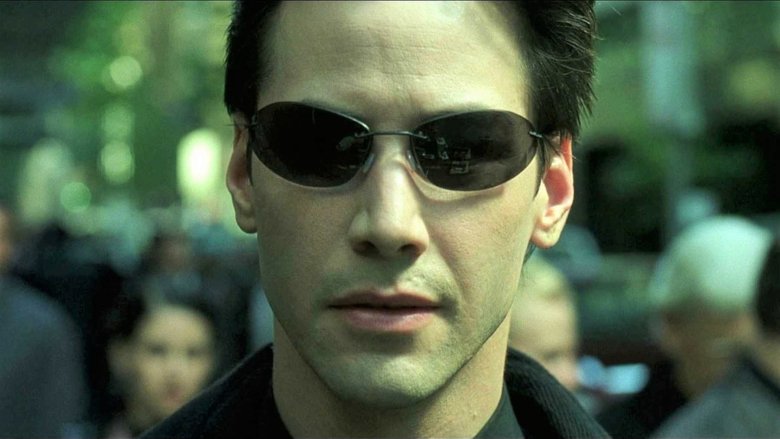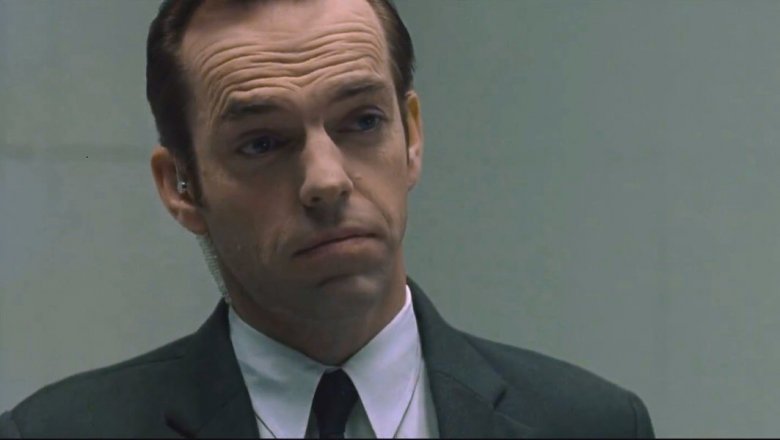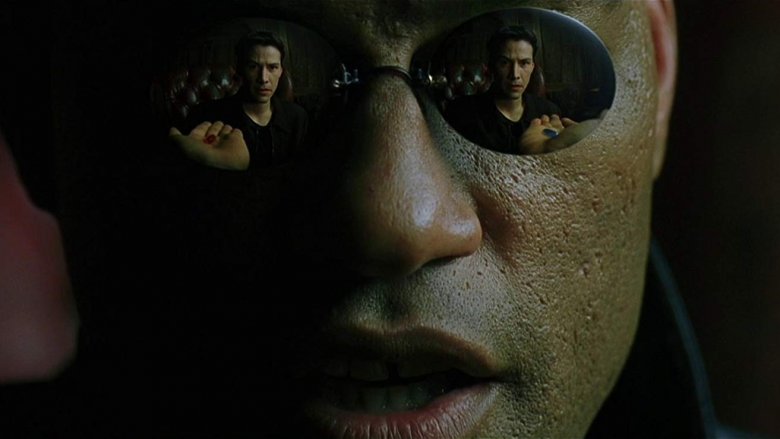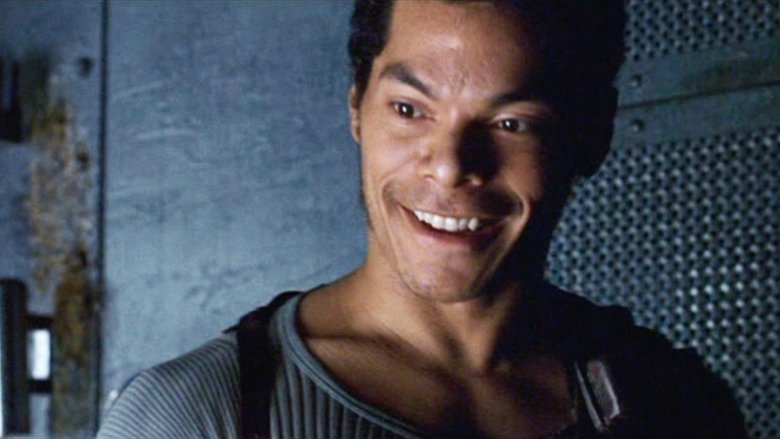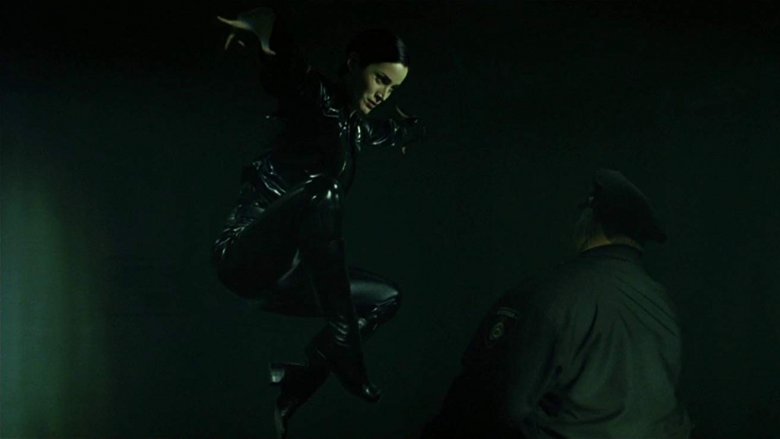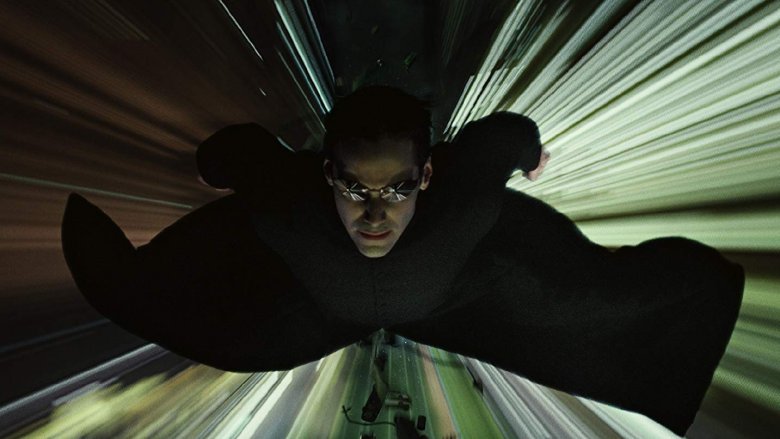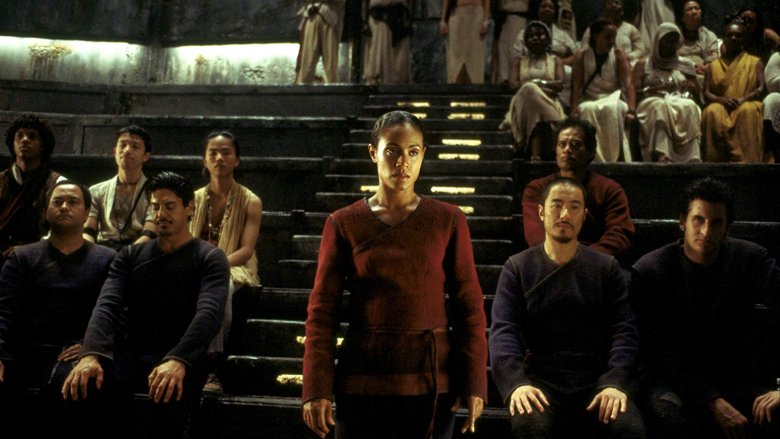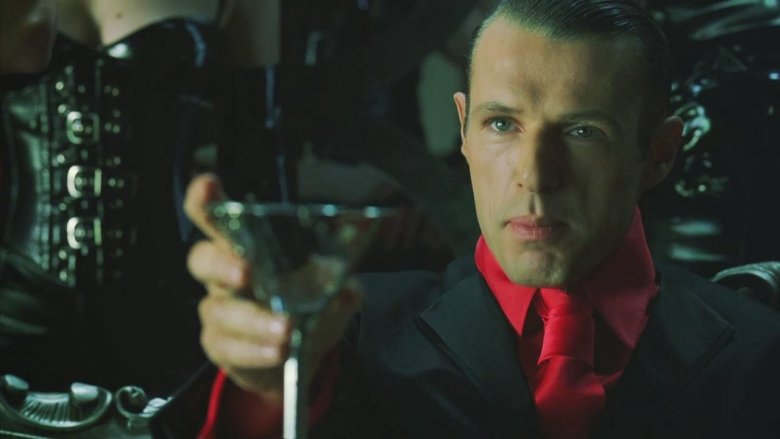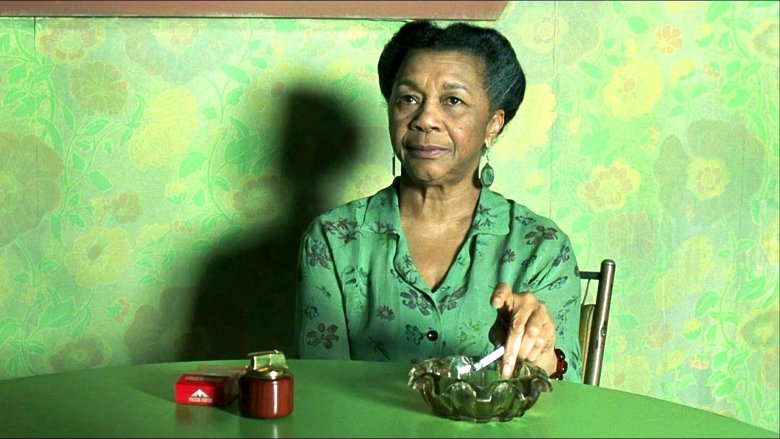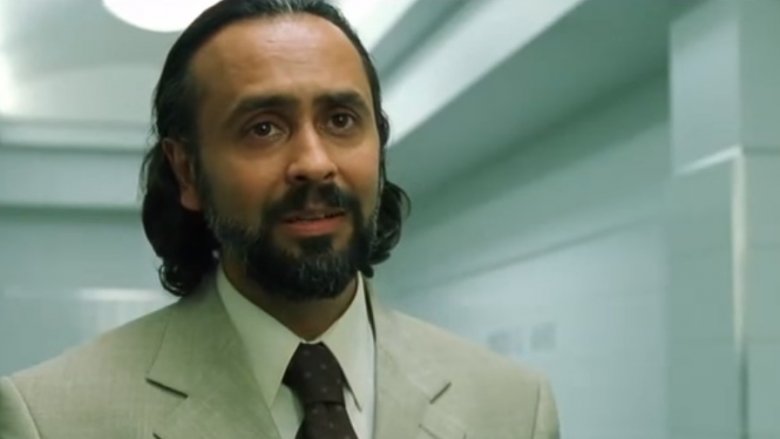Lines In The Matrix Movies That Mean More Than You Realized
Two decades ago, a pair of up-and-coming filmmakers released a science fiction film that combined kung fu, cyberpunk ideas about simulated reality, and turn-of-the-millennium aesthetics ... and it quickly became one of the most influential movies of its age. Directed by the Wachowskis, The Matrix was almost immediately hailed as a new sci-fi classic, and it became a global phenomenon that led to two sequels, The Matrix Reloaded and The Matrix Revolutions, both released months apart in 2003.
The Matrix films are an impressively layered experience. If you just want to watch a cool action movie full of inventive fight scenes and gunplay, they've got you covered. If you want to see a sci-fi spectacle, then you're good to go. If you want to dig deeper and get a philosophical experience about the nature of choice versus determinism while also questioning the nature of reality, the films have that in spades. They're so packed with meaning, in fact, that every line seems to carry deeper import than moviegoers noticed upon first viewing. In that spirit, we're looking at some of the most memorable lines from the Matrix films that have more way meaning than anyone realized.
What's the meaning of Agent Smith's threat?
In The Matrix, Neo's (Keanu Reeves) first encounter with his primary adversary, Agent Smith (Hugo Weaving), arrives early in the film, before Neo has been clued into everything that's really going on. They meet as part of an interrogation, in which Smith freaks Neo out with a variety of threats, including this seemingly simple statement: "You're going to help us, Mr. Anderson, whether you want to or not."
What the franchise hasn't yet established is that, even though it sounds like Smith is just playing "bad cop," the agent is actually correct, at least in theory. We'll later learn in The Matrix Reloaded that Neo's status as "the One" is actually a piece of programming implanted in him by the Architect as part of a plan that will allow the Matrix to reboot and preserve the appearance of choice among the human race. At this point in the story, Neo is unknowingly a tool of the Machines and the Matrix, and he won't figure that out until part two.
The eyes of the One play an important part in the Matrix movies
After he meets Morpheus (Laurence Fishburne) and agrees to take the red pill, Neo awakens in his pod among the human farm and is taken aboard Morpheus' ship. As he learns the truth on board the Nebuchadnezzar, he asks Morpheus, "Why do my eyes hurt?" The answer Morpheus provides is simple: "Because you've never used them before." And that's technically true, because Neo's biological form has been locked up inside that gel-filled pod for decades.
But Neo's question also offers some interesting foreshadowing for the future of his eyes. His peepers get brought up again in The Matrix Reloaded when the Merovingian, aware Neo can now see the Matrix's code, asks, "You can see it, Neo, yes?" Then, in The Matrix Revolutions, Smith (in Bane's body) blinds Neo with an electrical cable, causing intense pain but also giving Neo a new level of sight. His eyes are useless, but he can still see the energies around him as pure light, which he uses to make his final journey to the Machine City.
Neo the machine
After Neo is woken up and pulled from his pod, he begins his training under the tutelage of Morpheus and his crew. This includes sessions with Tank (Marcus Chong), who plugs Neo into his system and uploads a variety of training programs into his brain, including skills in various martial arts. Neo is immediately thrilled by this process, and he endures hours of uploading at Tank's hands. When Morpheus comes to check on him, Tank says of Neo, "He's a machine."
Tank is, of course, simply referring to Neo's endurance as he undergoes the strain of the uploading process hour after hour, but he's actually weirdly close to the truth of Neo's actual identity. Though we won't learn it until Reloaded, Neo is actually a tool of the Machines, while not being a Machine himself. He was designed to be an asset to them, to help in the rebooting of the Matrix and the further use of humanity as a docile power source. In a sense, the Machines built Neo and coded him for their own purposes, so yeah, Tank is totally right.
Can the Matrix tell you who you are?
Shortly after he learns the Matrix is nothing but a simulation, Neo spends some time contemplating his old life, which he thought was real but was really all in his head. As he struggles with coming to terms with that truth, he asks Trinity (Carrie-Anne Moss) what it means that all of his memories never happened. And that's when she replies, "That the Matrix cannot tell you who you are."
Trinity's response is based in her belief in the cause of freedom for humanity. She wants to condition Neo to the new reality that he's living in, which will allow him to exercise his own free will in ways he never could before. What's interesting about it, though, is that while she turns out to be correct, the Matrix does spend a good deal of time in the course of the sequels trying to tell Neo who he is. A huge swath of Reloaded is devoted to characters like the Architect attempting to explain to Neo that he was programmed to reboot the Matrix, and that he is not unique. There have been other Ones before, and there will be other Ones after, if all goes according to plan. The Matrix can tell you who you are, but Neo must overcome that fact to achieve peace.
Knowing the path vs. walking the path
Early on in The Matrix, Neo first meets the Oracle (Gloria Foster), who tells him in a matter-of-fact way that he isn't the One. Neo eventually proves this statement wrong by saving Morpheus and defeating the Agents at the end of the film, and when he tries to protest that he can't be the One because the Oracle said so, Morpheus explains she told him "exactly what he needed to hear," and then goes on to say, "There's a difference between knowing the path and walking the path."
Neo spends much of the trilogy struggling with this fact, especially since he's living in a world with prophecies and an old woman who seems to know his future. He asks a lot of questions in an effort to determine exactly what he must do, and some people — like the Architect — attempt to lay his path out for him very clearly in an effort to manipulate him. The Architect tells him that if he goes through the door that allows him to save Trinity, he will effectively end the human race ... but Neo goes anyway. He walks the path instead of attempting to know it, and finds a third way that allows him to save both Trinity and the future of Zion.
Some things never change in the Matrix movies
In The Matrix Reloaded, we're introduced to Captain Niobe (Jada Pinkett Smith), a hovercraft captain and, apparently, a former lover of Morpheus. During the celebration at Zion, Niobe says that she remembers Morpheus dancing and being good at it, and he replies, "There are some things in this world, Captain Niobe, that will never change."
They're interrupted before he can prove he can still dance, but a version of this line is traded between Niobe and Morpheus several more times throughout the trilogy. On the surface, it's a way of showing that they still perhaps have feelings for each other, and that they still sometimes frustrate each other with their opposing methods of getting things done.
There does seem to be a deeper meaning here, though, one that perhaps neither character is truly aware of. Morpheus doesn't know it yet, but his revolution within Zion is something that has happened before, and something that the Machines plan to let happen again. They're existing within a predetermined cycle of reboots that allows the Machines to maintain control. In that way, some things never change. Of course, Neo does actually manage to achieve peace, so it makes a lot of sense that by the end of the film, the line evolves to, "Some things never change ... but some things do."
The Merovingian has something to say about predecessors
In The Matrix Reloaded, Neo meets the Merovingian (Lambert Wilson), a very old program who seems to simply exist as a rebellious libertine, drinking fine wine and martinis while smuggling rogue programs out of their assigned roles and cultivating an army of deadly henchmen. When he meets Neo, he believes he can overcome him with the help of his goons, but quickly finds that Neo is more skilled than he perhaps anticipated. In a moment of frustration, he declares, "I have survived your predecessors, and I will survive you."
In the context of the moment, audiences might have thought the Merovingian meant that he'd lived through other freedom fighters trying to outwit him, or perhaps he'd survived other, false One who'd come along in the past. But as the Oracle said in a previous scene, the Merovingian is "one of the oldest of us," which means he's a holdover from a previous version of the Matrix. That means he actually did know other Ones in other versions of reality, and he made it through each reboot to continue to live his hedonistic life.
The Oracle has a meta-line with tragic meaning
When Neo, Morpheus, and Trinity visit the Oracle in The Matrix Revolutions, they find her appearance has changed, though her tendency to smoke and bake cookies has not. Plus, as she later says, she still loves candy. At first, they don't recognize her, and she confirms that she still has trouble recognizing herself. Her changed appearance is only briefly explained, but she says that she made a choice that "cost her," adding, "I'm sorry I couldn't be sitting here like you remember me, but it wasn't meant to be."
Gloria Foster played the Oracle in The Matrix Reloaded, but she died in September of 2001 before filming on The Matrix Revolutions could be completed. Mary Alice stepped in to play the role for the final film, and the character's changed appearance was written in as a result of the choices she made in aiding Morpheus and Neo. In apologizing for not being as she was, the Oracle (and by extension, the Wachowskis) is expressing sorrow that Foster is no longer part of the story, while also acknowledging the movies had to move on anyway.
A simple line but a powerful lesson
In The Matrix Revolutions, while Neo is unconscious in the real world, his Matrix self is also in a form of limbo which manifests as a subway station he can't escape from, controlled by a rogue program known as the Trainman. While there, he meets an Indian family, revealed to be programs who are being smuggled into hiding so the Source will not delete them. The father of the family, Ramachandra (Bernard White), explains he's doing this because he loves his wife and daughter. Neo expresses surprise that a program can feel love, and Ramachandra responds, "It is a word. What matters is the connection the word implies."
Neo spends much of The Matrix trilogy adjusting to a new reality and to his apparent destiny as "the One," only to be told in Reloaded that it was all part of another level of programming. He's a One but not the One, just another cog in the machine designed to keep humanity oppressed. In understanding that the connection to the word is the key, he's able to embrace his destiny as the One, and change things for the better, just as he was able to love Trinity by understanding his connection to her. It's a small lesson that Neo has to learn, but it's an important one nonetheless.
